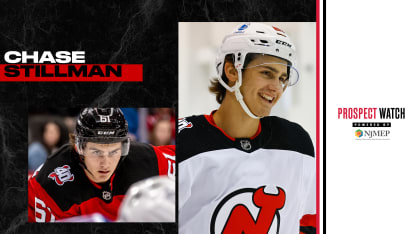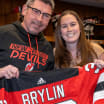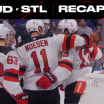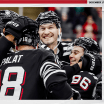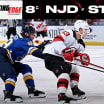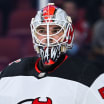Stillman is a personality, as you can tell. He’s fun, he’s jovial and he’s very engaging. He loves telling a good story, but he also has a serious introspection that perhaps isn’t as noticeable to those on the perimeter. It has been nearly four years since he was drafted 29th overall in 2020, and it has been a journey not only into a new phase of his career but also his life as an individual. He’s had to learn to navigate life as a professional hockey player, especially as it relates to playing in Junior, with a billet family looking after you and where the competition level isn’t quite as fierce. It’s also a moment where players are sometimes forced to reckon with the player they were in Junior might not be the same player that will make them successful professionally.
And for Chase, that became the crux of beginning to put it all together. The player he needs to be now at this level of hockey is not the same one he could be playing Junior with the Sudbury Wolves and Peterborough Petes of the Ontario Hockey League.
“The biggest thing for me was after the draft, I had that little bit of identity crisis, where it was always like I wanted to score and do things more than what I was doing,” he said, “But it's like, that's not why, that's not why you were picked and are here. And that's not where you were picked and not why I was drafted for New Jersey. We have a great support staff and management staff here. They’ve been very clear, my last couple of years in Junior.”
That identity crisis, so to speak, needed to be met with a realization that many young players across the league go through. That moment of realization needs to be met with some introspection as well.
Who you were in Junior isn’t necessarily who you are going to be when you hit the professional leagues. Expectations do change, just as the game changes from one league to the next. In wandering through that process, Stillman leaned on the Devils organization that drafted him, as well as his father, Cory Stillman who played over 1000 games in the NHL and won two Stanley Cups.
“The two meetings I had with Fitzy at the end of main camp was always about (…) me trying to figure out what I can do to be an impact player in (the AHL), and then it’s going to transition into the next league. For me, I know it’s about having that motor and being able to be an energy guy and fly around and skate up and down the ice. The way I thought about it, I really do feel like I can do that naturally, but I think my next step for the NHL is to be able to execute more with making plays and generating more offensively. It’s been a fun learning year this year.”
Any time you had the opportunity to interview Stillman after he was drafted in 2020, he’d have this regular refrain of wanting to “get to the NHL as fast as I can”. It’s a great mindset to have in theory, but it also needs to be qualified with being ready. Those are two entirely different things. And that’s where his dad Cory has played a big part in what Chase calls “a sense of relief”.
“He kind of would break down some of the other players that he played with and he's like, ‘You know how special you have to be to be one of those guys in the NHL?’, sometimes it's like usually the special players they come in and when they're young they can do it right away,” he shared of his father/son conversation. “Then it's like when you break down and you look at other guys who score a lot and consistently, it might take them five or six years. They may play three, four years in the minors, a little bit back and forth. And then when they play in the NHL, they have the confidence, they believe in their game.”
And that is the direction Stillman is moving in, in his first year in the American Hockey League. His confidence is growing he says, and he’s put his full trust in the process that it will take to eventually make it to the NHL. There is a weight lifted, in a way, having been able to ease his mind, find that sense of relief, and just concentrate on figuring out his game.
“For me, individually, I just want to improve and get better at my individual stuff,” he said, “For me that's hanging on to the puck more through the neutral zone and try to make plays offensively, finding the areas to score. I think the rest of the year is to, I want to win a lot more and get into the playoffs, but then for me, it's just working on individual stuff, what can do to be better? And what's going to help me make this jump?”
He's embracing where he is right now and staying focused on the here-and-now has helped change just about everything.
"I would say it’s almost more like a breath of relief, almost like a stress reliever," he said of his shift in mindset, "I just remember even in Junior when I wouldn't play as many minutes as I wanted to, or as much as I wanted to, now it's like, ‘Oh my god, I'm a first rounder and people think I can't score, people think I can't get an assist. And I was always getting so worked up about what my HockeyDB, or something like that would look like.
"When I kind of broke down is when I talked to my dad, talked to Fitzy," he continued, "I really realized that I looked at it, it's like okay, I'm not going to come in here and be the Jack Hughes, they already have Jack Hughes, they have a Jesper Bratt, a Nico Hischier, they already have guys that could do that. So it's like, what am I going to be able to do that's going to help make this team be better in a sense that a couple years, if I can come in, or what can I do to better this team. That was the fun part, I think I found this year where it's like, okay, if I can get really good at this and start expanding this even more, then we get even better. So I think that's been the fun part of me for this year is actually enjoying the improvement of my game.”
As much as his game is growing on the ice, Stillman clearly has also evolved into learning more about himself and understanding himself better. He's always known what he wants - to get to the NHL - but now he understands how that process will look for him as an individual.
He's growing as a person. Whether it was taking care of a bat swirling around his roommate’s bedroom at 1 a.m. or understanding who he needs to be on the ice, there's been a lot of change. But where he is now with his mindset and understanding may just be part of the puzzle to begin putting it all together.
“Everybody wants to be like (Connor) McDavid or (Auston) Matthews,” he said, “But it's like, there's a lot of pride and it takes guys like the other guys to win championships. And it's like if I can be a guy that can help a team win and (others) say this is a guy that you want on a winning team, well then that's what I'd want to be.”

